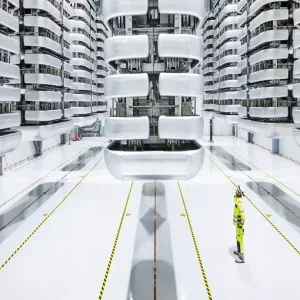
EU Commissioners Maria Damanaki and Günther Oettinger have presented details of a new action to facilitate the further development of the renewable ocean energy sector in Europe.
A central element in this action plan will be to establish an Ocean Energy Forum, bringing together stakeholders to build capacity and foster cooperation. The action plan should help drive forward this nascent ‘blue energy’ sector towards full industrialization, a statement by the Commission said.
European Commissioner for Maritime Affairs and Fisheries, Damanaki, said: "As our Blue Growth strategy highlights, seas and oceans have the potential to generate huge economic growth and much-needed jobs. By helping the ocean energy sector to fully develop we can fulfil this potential through innovation while also securing clean, renewable energy for Europe."
"Ocean energy has a significant potential to enhance the security of supply," added European Commissioner for Energy Oettinger. "This Communication aims to contribute to promote technological innovation and to reach the Objectives of the Europe 2020 Strategy and beyond. Developing a wide portfolio of renewable energy sources including ocean energy also facilitates their integration in the European energy system."
The ocean energy resource available globally exceeds present and projected future energy needs. Exploiting this energy would set the EU further on track to becoming a low-carbon economy and, by cutting EU dependence on fossil fuels, would enhance energy security. Moreover, ocean energy could help to balance out the output of other renewable energy sources such as wind energy and solar energy to ensure a steady aggregate supply of renewable energy to the grid. In addition, ocean energy has the potential to create new, high quality jobs, particularly in Europe’s coastal areas which often suffer from high unemployment.
Despite its undoubted potential, this promising new sector is facing several challenges which need to be faced to support this emerging sector to reap significant economic and environmental benefits and become cost-competitive with other forms of electricity generation:
• Technology costs are high and access to finance is difficult.
• Substantial infrastructure barriers, such as grid connection issues or access to adequate port facilities and specialised vessels.
• Administrative barriers such as complex licensing and consenting procedures, which can delay projects and raise costs.
• Environmental issues to be faced, including the need for more research and better information on environmental impacts.
The Commission already supports several initiatives on ocean energy. This new action plan has been developed to create a forum to bring together existing knowledge and expertise, create synergies, provide creative solutions and drive the development of this sector forward. It is a tool to help the stakeholders to develop a Strategic Roadmap for the ocean energy sector, which could be the basis for a European Industrial Initiative at a later stage, said the Commission.
News of the action plan has been welcomed Nordic marine energy technology company Minesto. Company CEO Anders Jansson commented: "It is truly exciting that the European politicians realize the potential for tidal energy to play this important role in a sustainable future, contributing to economic growth especially in fossil fuel dependant countries. Minesto welcomes the plans and sees that our development plans are in line with EU’s strategies."
Minesto recently announced that its marine power plant Deep Green is now producing electricity in the waters off Northern Ireland, a major breakthrough for the company.






